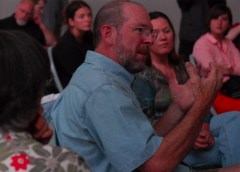Last week I attended the Climate Action Plan Town Hall in North Portland. The event was a chance for Mayor Sam Adams to explain the City’s stance on climate change and to address feedback on the draft version of their plan.
About 50 people gathered in the University Park Community Center. After an introduction by the leader of the Urban League of Portland (where he expressed concerns about a lack of racial equity in the plan), Mayor Adams led attendees through a series of votes. The results were tallied instantly thanks to little clickers passed out prior to the presentation.
One of the questions was, “How do you get around town?” and 30% of respondents said by transit/bike/walk only. Adams told us that was the highest percentage he’d seen anywhere in the city (this was the eighth town hall).
Before getting into the prepared presentation, Adams gave all the climate change naysayers a chance to share their opinions. Several people said climate change isn’t real and that it’s just a natural occurrence. “Al Gore is a fraud!” one of them explained. “‘Smart Growth’ is just a code word for United Nations Agenda 21…look it up on the Internet!” exclaimed another.
Once into the presentation, I paid close attention when they came to the “Land Use and Mobility” section. Michael Armstrong, deputy director of the Bureau of Planning and Sustainability, pointed out that 39% of our greenhouse gas emissions — the largest of any other sources — come from transportation.
To help lower that percentage, the city said they’re committed to density and listed the creation of “vibrant neighborhoods where 90 percent of Portland residents…can easily walk or bike to meet all basic daily, non-work needs,” as one of their 2030 objectives. Neighborhoods are important because, as Adams pointed out, only one-third of Portland transportation trips are work-related.
“Invest in advanced telecommunications infrastructure to enable widespread e-commerce and telecommuting.”
— An action item listed in the plan’s Land Use and Mobility chapter
Other action items in the transportation sphere included funding streetcar development and “first tier” improvements listed in the upcoming update to the Bicycle Master Plan.
Important to meeting their objectives will be to get people out of cars. Their 2030 goal is to reduce per capita vehicle miles traveled by 50% from 2008 levels. One novel way proposed by Adams to get people to drive less is to encourage telecommuting. This is the first I’ve heard of this as an official “action item” from the city, but there it was, listed under “2012 Actions” as, “Invest in advanced telecommunications infrastructure to enable widespread e-commerce and telecommuting.”
Another idea mentioned by Adams was charging people in cars to enter downtown (a.k.a. congestion pricing). The Governor has given Portland a green light to do a pilot program, but even so, Adams brought up the concept carefully, saying it’s an idea first put forward by conservatives in the Bush administration.
The good news for Adams and the City is that Portland is primed for a low-car future. One of the instant voting questions was “How likely are you to switch out some of your car trips with bike or transit?” 68% percent voted “I already do this often,” 32% chose “I could do that,” and no one voted for the “I am unlikely to try that” option.

At the outset of the town hall, Adams asked what questions people wanted answered. An assistant wrote them all down and stuck them on the wall. Then, at the end of the presentation, Adams went back through each question and either addressed it, or tasked a staffer to find out more about it.
Adams’ attention to everyone’s perspectives (whether or not they jibed with his own) on this sometimes controversial issue was appreciated by attendees. Even those who challenged the City’s plan ended up thanking Adams for his handling of the event and the opportunity to speak. The mood was constructive and positive. There were even a few unsolicited rounds of applause and I don’t think anyone left early (which is surprising for a weeknight meeting that went until after 8:30 pm).
There are no more town halls planned, but today is the last day to submit public comments on the plan. You can do so online here.




